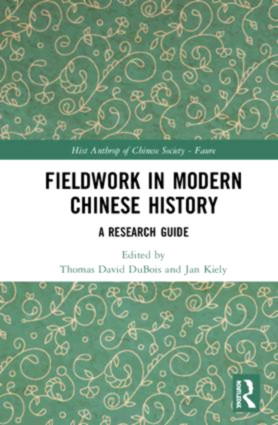
Fieldwork in Modern Chinese History:A Research Guide
Edited by Thomas David DuBois, Jan Kiely
Publisher:Routledge (2019)
Hardback: 9780367263911
Pages:384
Description
This book explores how fieldwork has been usedto research Chinese history in the past and new ways that others might use in it the future. It introduces the previous generations of scholars who ventured out of the archive to conduct local investigations in Chinese cities, villages, farms and temples. It goes on to present the techniques of historical fieldwork, providing guidance on how to integrate oral history into research plans and archival research, conduct interviews, and locate sources in the field. Chapters by established researchers relate these techniques to specific types of fieldwork, including religion, the imperial past, natural environments and agriculture. Combining the past and the future of the craft, the book provides a rich resource for scholars coming new to fieldwork in the history of China.
Table of Contents
Editors’ preface: Fieldwork in Modern Chinese History
Thomas DuBois and Jan Kiely
I: History and fieldwork in historical perspective
Chapter 1. They went to the people but did they hear them? Comments on Field Research in China the 1920s and 1930s
David Faure
Chapter 2. A brief history of Japanese field research on China
Linda Grove
Chapter 3. The Traditionalist Phase in Taiwan Anthropology: 1960-80
Myron L. Cohen
II: Work reflections: Fieldwork in the mirror
Chapter 4. Fieldwork for Ming historians
Michael Szonyi
Chapter 5. Conducting fieldwork as a local: Perspectives from Hulunbuir
Guan Yuxia and Zhang Wei
Chapter 6. Who Are They, and Who Am I?: Discovering Gender and Ethnicity in the Sino-Tibetan Borderland
Xiaofei Kang
Chapter 7. Ritual performance in changing local society
Stephen Jones
Chapter 8. Beyond the border of disciplines and societies: From fieldwork among the Lahu to the history of bazi basins
Jianxiong Ma
III. Walking the ground, talking to people
Chapter 9. Basic Questions for Fieldwork on Pre-1949 Chinese Society
John Lagerwey
Chapter 10. Festivals in the Field--A Social Historical Perspective
Paul R. Katz
Chapter 11. Doing historical-anthropological fieldwork in Jiangnan: gazetteers, newspapers, and real life
Vincent Goossaert
Chapter 12. Incorporating historical GIS in fieldwork on Chinese culture and religion
Kenneth Dean
Chapter 13. Walks in Canton: Doing Historical Anthropology in a Chinese City
May Bo Ching and Zhiwei Liu
Chapter 14. Contextualizing Ethnic Classification: The Case of hemu (合亩) among the Li of Hainan
Xi He
Chapter 15. Mud on Your Boots: Researching the Social and Environmental History of Conservation in Baishui County, Shaanxi during the 1950s
Micah S. Muscolino
Chapter 16. Medicine, health and disease: Among the barefoot doctors of Hangzhou
Xiaoping Fang
Chapter 17. Discovering the Cultural Revolution through oral history
Guoqiang Dong
Chapter 18. Walking a production chain: An interdisciplinary approach to the history of things
Thomas David DuBois
IV. Finding and working with grassroots documents
Chapter 19. Field research using contracts (qiyue): Legal archives of late Qing and early Republican-era Longquan, Zhejiang
Zhengzhen Du
Chapter 20. Account books (zhangben) in local history studies
Yonghua Liu
Chapter 21. Land and property deeds and urban studies: A case study of deeds collected by Ms. Liu,
Sujuan Huang
Chapter 22. Genealogies and Revolution in the Jiangxi Soviet
Weixin Rao
Chapter 23. Using local and Public Security Bureau archives from the 1950s—Poyang county, Jiangxi,
Shigu Liu
Chapter 24. Exploring a northern Jiangsu County Intangible Cultural Heritage Archive
Jan Kiely

